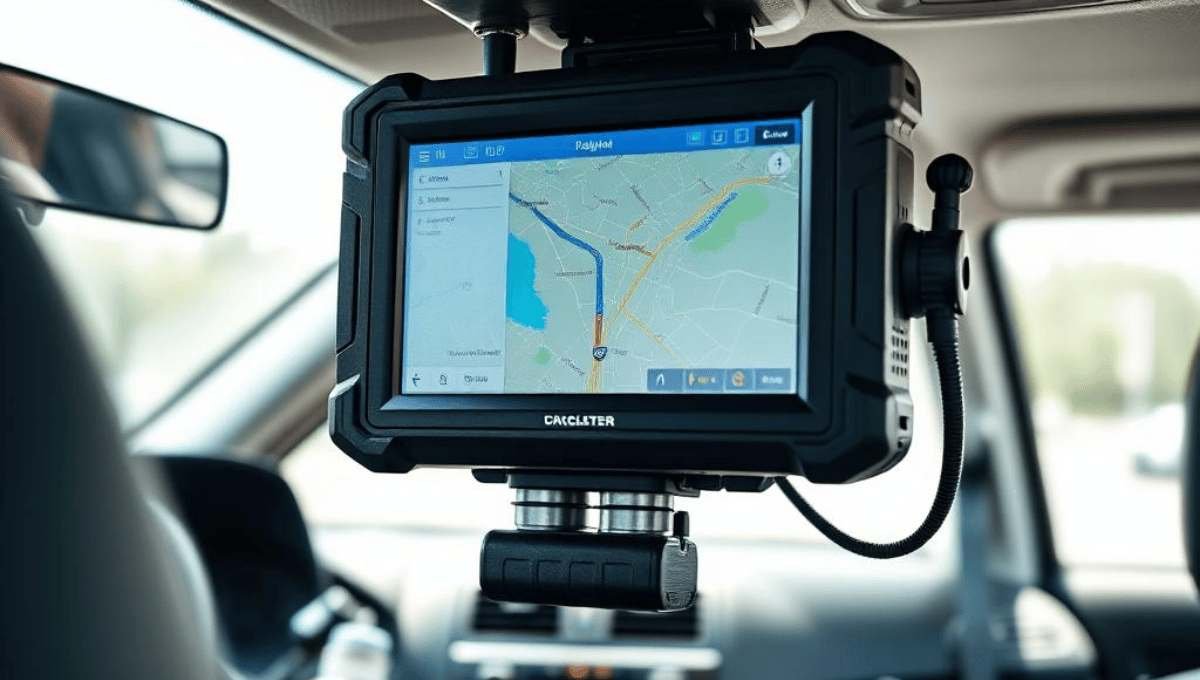A Mobile Data Terminal (MDT) connects field operators with centralized systems for data exchange. These terminals are common in transportation, public safety, and logistics industries. Over the years, MDTs have transitioned from basic communication tools to sophisticated devices that handle complex data processes.
Imagine a device that brings real-time data, seamless communication, and advanced tracking directly into the hands of field operators. A Mobile Data Terminal (MDT) does exactly that. From police vehicles to delivery trucks, MDTs have become the backbone of industries that rely on quick decision-making and accurate information. These versatile tools are no longer limited to basic tasks they now handle complex processes, optimize workflows, and improve safety. As businesses and services grow more connected, MDTs are shaping the future of efficiency and communication in ways once thought impossible.
Table of Contents
How Mobile Data Terminals Work
Mobile Data Terminals (MDTs) combine hardware and software to enable seamless data collection, processing, and transmission. They rely on essential components like input devices, processors, and connectivity modules to function effectively. Data is sent to central servers in real-time, ensuring accurate updates and efficient monitoring. This system supports communication and workflow optimization across industries, making MDTs indispensable tools for field operations.
- Input Devices: Input devices like keyboards, touchscreens, and microphones enable users to interact with MDTs efficiently. These interfaces simplify data entry, whether it’s for dispatch communication, updating records, or accessing essential information. Their user-friendly designs make operations smoother in high-pressure environments.
- Processors: MDTs rely on powerful processors to run applications and quickly process vast data. These processors ensure smooth functionality, even when handling complex tasks like GPS navigation, database access, and real-time communication with central systems.
- Connectivity Modules: Connectivity modules, including cellular, Wi-Fi, or satellite connections, ensure MDTs remain online. They facilitate real-time data sharing, allowing for timely decision-making and improving operational efficiency in dynamic situations.
Data is sent to a central server, allowing real-time access for monitoring and updates.
Key Features of Mobile Data Terminals
- Rugged Design
MDTs are designed to endure extreme conditions, including dust, moisture, vibrations, and temperature fluctuations. This durability ensures they perform reliably in harsh environments like construction sites, vehicles, and industrial settings. - Real-Time Communication
MDTs enable instant data sharing between field operators and central systems. This feature enhances collaboration and ensures accurate information exchange, critical for time-sensitive operations like public safety and logistics. - GPS and Navigation Systems
Integrated GPS technology provides accurate location tracking and navigation support. This ensures efficient routing for fleets, timely emergency response, and improved resource allocation in various industries. - User-Friendly Touchscreens
Touchscreens on MDTs are intuitive and responsive, simplifying tasks for users. Their clear interfaces are designed for quick data input and easy application access, even in fast-paced or stressful scenarios. - Customizable Software
MDTs come with adaptable software platforms that allow businesses to configure the devices according to their specific needs. This flexibility ensures the devices meet industry requirements, whether for logistics, safety, or fleet management.
Applications of Mobile Data Terminals
- Fleet and Logistics Management
MDTs optimize fleet operations by enabling real-time tracking, route planning, and inventory management. These features help improve delivery timelines and resource efficiency in transportation and logistics. - Public Safety
Emergency responders, including police and firefighters, use MDTs to access real-time updates, communicate with dispatch centres, and maintain situational awareness during critical operations. - Public Transport Systems
MDTs streamline public transportation by managing schedules, providing navigation, and supporting fare collection. This enhances operational efficiency and improves passenger experiences. - Construction and Agriculture
MDTs monitor heavy machinery, track resources, and assist with task coordination on construction sites and agricultural fields. This ensures better productivity and safer operations. - Retail Supply Chains
In retail, MDTs ensure accurate tracking of inventory, timely order fulfilment, and seamless coordination within supply chains. This leads to better stock management and customer satisfaction.
Benefits of Mobile Data Terminals
- Enhanced Productivity
By automating routine tasks, MDTs free up time for employees to focus on core responsibilities. This boosts overall productivity and operational efficiency across industries. - Improved Accuracy
MDTs reduce errors by ensuring real-time data updates and seamless communication between teams. Accurate information leads to better decision-making and fewer mistakes. - Cost Efficiency
Automating processes with MDTs minimizes labour and administrative costs. Their efficiency helps businesses save resources while achieving higher output. - Safety Improvements
MDTs enhance safety through features like GPS alerts, hazard notifications, and live communication. These capabilities help operators avoid risks and improve situational awareness. - Scalability
As businesses expand, MDTs can adapt to growing needs. Their versatile software and hardware solutions support scalability without significant additional investment.
The Role of Security in Mobile Data Terminals
Security plays a vital role in protecting the data processed by MDTs. From sensitive law enforcement information to business operations, secure platforms ensure data integrity and confidentiality.
Encryption for Data in Transit
Encryption protects data as it travels between devices and servers, safeguarding it from unauthorized access and interception.
Firewalls and Antivirus Software
Firewalls and antivirus solutions prevent malicious attacks on MDT systems, ensuring secure operation across networks.
Regular Software Updates
Frequent updates patch vulnerabilities and keep MDTs equipped to handle emerging security threats, maintaining data integrity over time.
Trending: Mastering Application Acceleration Manager
Mobile Data Terminals for Law Enforcement
Instant Access to Databases
Police MDTs provide officers with immediate access to critical databases, allowing them to check vehicle records, criminal histories, and more on the spot.
Secure Platforms for Reporting
Modern MDTs ensure secure communication and reporting, helping officers share information quickly without compromising data confidentiality.
GPS Tracking
Integrated GPS enables law enforcement to navigate efficiently and respond to emergencies faster, improving public safety outcomes.
How to Choose the Right Mobile Data Terminal
- Durability
Choose MDTs that are built to withstand physical stress, ensuring consistent performance in tough conditions like construction sites or emergency vehicles. - Software Features
Select devices with software tailored to your industry needs, such as route planning or real-time data collection for logistics or safety operations. - Connectivity
Ensure the terminal supports reliable connectivity, whether through cellular, Wi-Fi, or satellite to keep operations uninterrupted. - Vendor Support
Opt for providers offering comprehensive customer support for installation, training, and troubleshooting, ensuring seamless integration. - Cost
Balance the upfront investment with the long-term value of MDTs by evaluating their efficiency, productivity benefits, and lifespan.
Challenges in Adopting Mobile Data Terminals
High Upfront Costs
The initial investment in MDT hardware and software can be significant, but the long-term benefits often justify the expense.
Connectivity Issues in Remote Areas
In areas with limited network coverage, maintaining a stable connection can be challenging, affecting real-time data transmission.
Training Staff Effectively
Employees may require training to use MDTs efficiently, but proper onboarding ensures smoother operations and maximized benefits.
The Future of Mobile Data Terminals
The future of MDTs lies in advanced technology integration. AI can improve predictive maintenance, while IoT connectivity enhances data sharing across devices. These innovations will make MDTs even more efficient, user-friendly, and indispensable in diverse industries.
Conclusion
Mobile Data Terminals are essential tools that bridge the gap between field operations and centralized systems. These devices provide real-time communication, enhance productivity, and improve accuracy across industries like public safety, logistics, and fleet management. Their rugged designs and advanced features, including GPS and customizable software, make them adaptable to various needs.
The importance of secure software ensures sensitive data remains protected, especially in critical sectors like law enforcement. While initial adoption challenges exist, the long-term benefits, including scalability and cost efficiency, far outweigh the hurdles.
As technology continues to evolve, Mobile Data Terminals will incorporate AI and IoT, pushing the boundaries of efficiency and connectivity. Adopting MDTs now positions businesses and organizations to thrive in an increasingly data-driven environment.
FAQ’s
What is a Mobile Data Terminal?
A Mobile Data Terminal (MDT) is a device used in vehicles or by field personnel to send, receive, and process real-time data for communication and operational efficiency.
What is the Mobile Data Terminal in Police Cars?
In police cars, a Mobile Data Terminal provides officers with access to criminal databases, dispatch information, and real-time communication tools to enhance their response capabilities.
What is a Portable Data Terminal?
A portable data terminal is a handheld device designed for scanning, collecting, and transmitting data in environments like warehouses, retail, and logistics.
What is an example of a Data Terminal?
An example of a data terminal is a Mobile Data Terminal used in public safety vehicles or a handheld scanner used in warehouses.
What is the Mobile Data Terminal in an Ambulance?
In ambulances, a Mobile Data Terminal facilitates communication with dispatch, provides GPS navigation, and shares patient details in real time for faster response.
What is the Use of a Portable Data Terminal?
Portable data terminals are used for inventory management, asset tracking, and capturing real-time data in industries like retail, logistics, and warehousing.
What are the Different Types of Terminals Used for Data Input?
Terminals used for data input include Mobile Data Terminals, portable data terminals, and smart terminals with touchscreen interfaces.
What are the Three Types of Terminals?
The three types of terminals are dumb terminals, smart terminals, and Mobile Data Terminals for advanced, real-time communication.
What are the Two Basic Input Devices Used to Input Data?
The two basic input devices for data input are keyboards and touchscreens, often found on Mobile Data Terminals.
How Does a Dumb Terminal Work?
A dumb terminal functions as a simple interface, relying on a connected mainframe to process data, unlike a Mobile Data Terminal, which processes data independently.

